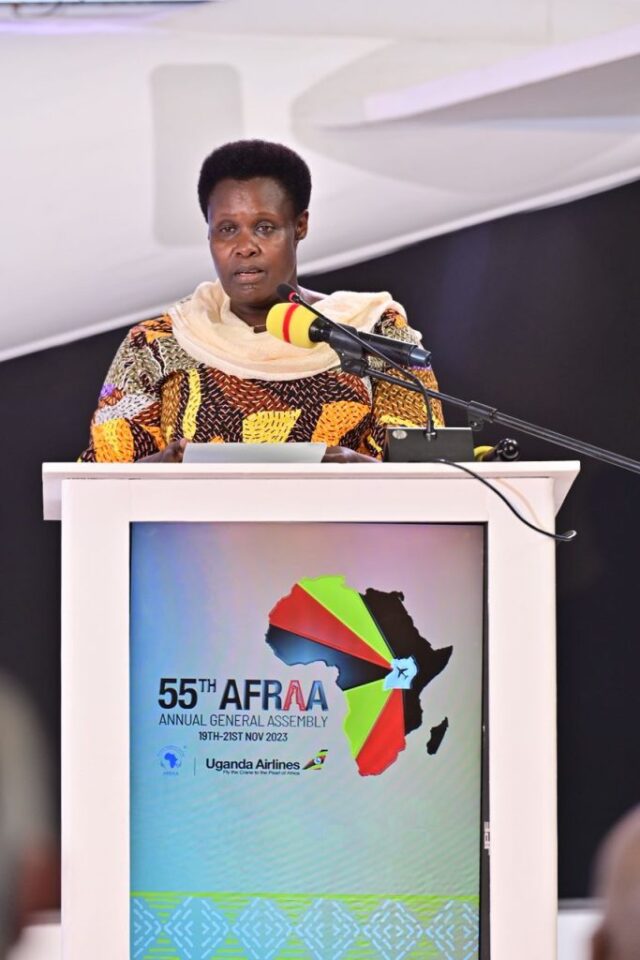
Joyce Namugambe
Speech by the Vice President H.E ( Maj) (RTD) Jessica Alupo during the African Airlines Association.
It gives me great privilege to welcome you not just to this Assembly but to our beautiful and warm country, The Pearl of Africa.
Your meeting comes at a time when African aviation is at that junction, where important decisions that position the industry to play its role in Africa’s socioeconomic transformation must be made.
During the Golden Jubilee celebrations of the formation of the OAU, the precursor of the African Union in May 2013, African leaders signed a 50th Anniversary Solemn Declaration which committed them to a vision of an integrated, prosperous and peaceful Africa, driven by its own citizens, representing a dynamic force in the international arena. The building blocks for the attainment of this vision are elaborated in Agenda 2063, which is the blueprint and Africa’s strategic framework for realizing the goal of an inclusive and sustainable development; anchored around unity, self-determination, freedom, progress and shared prosperity.
Agenda 2063 was borne of the realization that there was a need to recast focus from the priorities of the pre-independence; and instead concentrate on lifting the African people out of oppressive poverty, through inclusive social and economic development, continental and regional integration, democratic governance and peace and security.
Noble as these goals are; they cannot be realized in a vacuum. There are enablers that need to be in place to create the spark that will light and drive this dynamic machine called Africa.
The International Air Transport Association has described Air Transport as the Business of Freedom. It is indeed the business of freedom, because air transport shrinks both time and distance, facilitates the movement of goods, people and investment. Through easing travel, air transport also promotes economic and social integration, by facilitating those connections that bring us closer as human beings.
It is therefore a critical enabler, which Africa cannot do without because her rail and road infrastructure lack due coverage for interstate movement. As Africa pursues the goal of continental integration, it will be important to focus on growing Air transport for ease of intra-Africa connectivity.
But all this cannot happen without building trust. And trust is a product of a spirit of equity, give and take and a commitment to common rules and values.
Uganda Airlines was revived to improve air transport connectivity to and from Uganda to enhance the country’s competitiveness for faster economic transformation. Air connectivity has become central to our development agenda, and the national carrier is seen as an extension of national infrastructure.
We are committed to investing in the flag carrier and to facilitate her expansion within Africa, while also providing those vita air bridges between the continent and the rest of the world.
For that reason, we are proactive in driving Africa’s integration agenda and committed to removing any obstacles that might obstruct this goal in way.
I would therefore, like to conclude my remarks by encouraging you to be bold as you discuss the hurdles to the industry’s growth and to challenge us with new thinking around the issues holding us back.
Speech by the Minister Of Works and Transport Gen. Katumba Wamala:
Your Excellency the Vice-President of the Republic of Uganda, the Honourable Jessica Alupo
The Board of Uganda Airlines
Ms Jenifer Bamuturaki our host and CEO of Uganda Airlines
The Secretary General of the African Airlines Association Mr. Abdurahmane Berthe
The IATA President
The Director General of the International Airlines Association IATA
IATA Vice President for Africa and the Middle East
The Director General of the Uganda Civil Aviation Authority
Airline leaders, Regulators, Manufacturers’ Representatives and all our esteemed guests;
We are honored to have you here and it is with great pleasure that we welcome you to the Pearl of Africa. I hope you have had the opportunity to explore some parts of the Country and its offerings, and for those who have not, I urge you to stay longer and enjoy what this beautiful country has to offer.
First of all, allow me to thank you for choosing Uganda and, by extension, Uganda Airlines to host this prestigious gathering, and I hope we have and shall not disappoint you.
This meeting is taking place at a delicate time for global aviation. We are meeting under the shadow of heightened geopolitical risk and a soft global economy. This comes at a time when the Aviation industry is recovering from the drawbacks of Covid-19’s inevitable impacts on air travel.
From the Sudan, through the Levant to Ukraine, airlines are having to negotiate airspace disruptions, adding to the cost of operations.
All these challenges call for smart thinking and collaboration in the search for solutions. They also add a sense of urgency to the need to walk the talk on various initiatives that are meant to improve the viability of African aviation.
On the bright side, the market has registered a steady recovery from the Covid-19 downturn. In Uganda, as of September 2023, traffic through Entebbe was trending at 14% over the comparable period for 2019.
Operators are returning to their pre-covid schedules, and we have even seen some new entrants into the market.
Our flag carrier, Uganda Airlines, is expanding its network and now flies to 13 destinations.
All this activity points to a dynamic market and as a country, we are committed to playing our role in the development and growth of African aviation.
There is a growing trend in the development of intra-Africa travel; this has been observed by the investments into the infrastructure, such as Airports on the continent, to support the increasing demand for Air transport. You could have experienced some inconvenience upon your arrival, but this was due to the expansion of Entebbe International Airport works that are currently ongoing.
We welcome the Single African Air Transport Market (SAATM) and reaffirm Uganda’s commitment to join the initiative. Uganda has always pursued a pragmatic aviation policy that seeks to balance the needs of the travelling public while maintaining sanity and safety in the industry.
I can state, without any fear of contradiction, that Even under the Yamoussoukro Decision regime, Uganda has been one of the most open aviation markets on the continent. So, in principle, we have always supported the idea of a liberal African air transport market.
We, however, wish to note that SAATM is not an event but a process. To this end, we have commenced the process to align our legal regime with SAATM principles. In due course, we shall be announcing our commencement date.
Allow me to restate that SAATM is not a magic wand and needs supportive action in other areas before its full benefits can be realised. For instance, we cannot hope to make headway without opening our borders so that citizens can travel unimpeded.
Without opening borders, we are putting the proverbial cart before the horse, and the benefits will indeed be limited. I, therefore, congratulate those countries that have fully opened their borders to Africans.
On this note, it is my pleasure to once again welcome you to Uganda and wish you good deliberations.
Speech by Uganda Airlines CEO Jennifer Bamuturaki
Your Excellency the Vice-President of the Republic of Uganda, the Honourable Jessica Alupo
The Minister of Works and Transport Hon. Gen. Edward Katumba Wamala
The Secretary General of the African Airlines Association Abderahmane Berthe
The Director General of the International Airlines Association, IATA Willie Walsh,
the IATA Vice president for Africa and the Middle East, Kamil Al Awadhi
The Director General of the Uganda Civil Aviation Authority
Airline leaders, regulators and manufacturers’ representatives and all our esteemed guests;
Allow me on behalf of Uganda Airlines and the Ugandan tourism and travel community, to welcome you to the happiest and most welcoming nation in the world, the Pearl of Africa.
Accept my thanks once again, for giving us the opportunity to lead AFRAA over the past year. The period from July 2022 to the present, can best be described as one of mixed fortunes. When we took over the presidency, the industry was still grappling with the aftereffects of Covid-19 and adjusting to the disruptions occasioned by the war in Ukraine.
Earlier this year, in April, hostilities broke out in Sudan while we were preparing to start our operations in Khartoum, while we also had coups in Niger, Gabon and Burkina Faso. These situations are enemies to intra-African connectivity that would facilitate trade and doing business.
Globally, new sustainability requirements pose specific challenges for African airlines. This complicates an already difficult operating environment, driving up the cost of fuel and imposing costly closures of airspace.
Blocked funds remain a concern in some markets on the continent, taxation on industry that makes intra-African travel expensive.
I am pleased to report that these challenges have united us even more and deepened the conversations on how we can work jointly to mitigate them.
Despite the challenges, the industry in Africa has shown remarkable resilience and continued with its recovery from Covid-19 disruptions.
In its latest numbers, IATA reports that traffic in September 2023, was 28.1 percent above the same period in 2022. This is true and we see these numbers in our operations.
On a disappointing note, there has been no significant improvement to Africa’s share of the global passenger market which stagnated at 2.1 percent. This is the result of many factors, among them the status of the African economy, visa restrictions and closed markets within the continent.
It can be argued that the fastest way to improve this metric is to speed up market liberalisation to increase intra-African travel and justify the investment that operators need to make in additional capacity, infrastructure upgrades and regulatory revisions.
On a positive note, initiatives to open up the continent’s aviation and improve connectivity are gaining traction. At least two-thirds of African states have signed up to SAATM and are at different stages of implementation. Here in Uganda, internal conversations about joining SAATM have started.
When I took over the presidency of AFRAA, I defined my priorities for the year as:
Cutting the bureaucracy and red tape of regulatory regimes that impede intra-Africa connectivity.
Creating pathways for increased partnerships and collaboration within the continent to reduce the fragility of start-up Airlines.
Support initiatives that promote sustainable operations of Airlines on the continent by taking bold steps to invest in research.
Advocate for open skies through fully operationalizing the Yamoussoukro declarations.
I am glad to report that despite a slow start, working with the Executive committee and the AFRAA Secretary-General, we have initiated these conversations within the African industry, and we are beginning to see shoots of progress.
At Uganda Airlines, we are leading by example. Besides having women at the Board level and chief executive roles, we have worked to open up opportunities for women. We now have 6 women in the cockpit and many more in the pipeline. We are setting a youth innovation platform within the airline as our contribution to nurturing the next generation of aviators.
We are contributing to the Net-Zero Goal by imitating projects in conservation of Entebbe Eco-system it being a Bird sanctuary and cleaning up Lake Victoria through our Flight path project. We have also made changes and continue to make changes in our cabin line amenities to more sustainable materials and most importantly to reduce food waste on board. This project will ultimately reduce the bird hazard for more optimal operations out of the airport possible.
As a young Airline, we have been passionate advocates for small airlines. We cannot hope to achieve sustainable operations if we cannot see areas of synergy between established carriers and small start-ups.
Small airlines are important because they contribute to the systems resilience by adding flexibility to the ecosystem. They fill critical gaps and, offering last mile operations that would be impractical for the industry majors.
We therefore need to look at them in more positive terms and nurture them to grow. This is important for safety and growth of the industry because they recruit new passengers.
But my job this morning is simply to set the pace of the AGA and to Welcome you to the Pearl of Africa, but I trust we shall have enough time to discuss all these issues during these two days.






